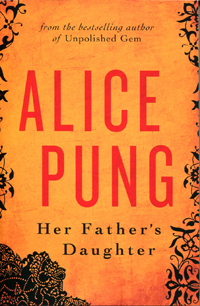Her Father’s Daughter
 Her Father’s Daughter
Her Father’s Daughter
Alice Pung
Black Inc Publishing 2011
ISBN: 9781863955423
$29.95
238 pp
Having just finished reading this book, I feel that I have been allowed to be an intruder in a family home. It is an autobiography written as a third person account, but it is very personal and revealing of the characters in the stories.
Alice Pung has chosen to explore her relationship with her father through a collection of vignettes, moving back and forth in time and from place to place. As a consequence, while there are parts of the book that may trigger very emotional responses from the reader, the ‘chapters’ are quite short, allowing many opportunities for a rest and a breather. I chose to read the book in a short time and was often left breathless and in tears.
A book such as this one, that deals with the reality of the murderous subjugation of one group, society or race by another, will necessarily evoke different responses in those for whom this is something ‘over there’ and in the past, than in those who have a more intimate connection with such atrocities. My parents and most of their families survived the systematic slaughter of Jews and other minorities by the Nazi regime. The reality of what they survived and the stories I was brought up with, have a profound impact on my response to reading about genocide, war, racism and mindless killing. I therefore have not been able to read this book as merely an observer – it had a visceral effect on me.
As we know from Alice Pung’s first autobiographical book, Unpolished Gem (Black Inc, 2006), she is the oldest of four Australian-born children, of a couple who came here as refugees from South-East Asia. Her father lived through the hell that was the Pol Pot regime in Cambodia. Her father’s experiences, and his very understandable emotional responses to those experiences, colour his relationship with Alice and, as a consequence, inform much of her behaviour and attitudes as she grows up and eventually embarks on a life living away from the family home.
Alice Pung’s writing is beautiful. The mastery she has over the language is obvious in that it never gets in the way of the story being told and in the apparent ease with which it is used to evoke place and atmosphere and in the subtle humour that bubbles up unexpectedly in the right places. She has a flair for writing that takes the reader into the situation and brings a smile or a nod of recognition. Here are some examples.
In describing her travel on a bus in China: “People are packed in like last-minute socks in a heaving suitcase.”
Sleeping alone on only a small part of a double bed: “… so that half of the bed exposed bare sheets, like a half-iced cake.”
Describing her father using discarded copper wire for acupuncture treatment in the Killing Fields: “He took out his needles and the ring of the copper wire was like a singing bee-sting.”
When visiting a field in Cambodia where many people had been buried: “The distance between the living and the dead was only a heartbeat’s fade away.”
Still about Cambodia: “She felt that this country was something precious – as brutal, as split open as a pomegranate, with hot breath and a million red buried eyes.”
Alice Pung looks at the world through her own eyes, as well as those of her father and mother, aunts and uncles, even a man who once treated children like expendable ants during the time of Pol Pot. Through talking to members of her family, relatives, friends and others, she brings to the reader many views of the same world. She exposes her struggle to make sense of it herself and of her conflicted search for love and relatedness. She also exposes the weight placed on the shoulders of most children by their parents and the effort it takes to identify this weight, because it is such a tightly bound mixture of unconditional love and the parents’ hang-ups, fears and aspirations, as well as the spoken and unspoken tales of their culture. The children can end up carrying much of this weight for the rest of their lives, even passing it on to their children.
Alice Pung explains that she was named for the wonderland her parents came to (in Australia) and in the telling of these stories she exposes a wider and sometimes more terrible wonderland. She also gives glimpses of redemption in the looking glass, for what she writes about is a truth, or a collection of truths, that we all live and struggle with. It is only by looking at ourselves and inside ourselves that we can discover how to find the path to that redemption. In her writing, Alice Pung describes that struggle and that possibility beautifully and with wonderful compassion.
© 2012 Daan Spijer
[to receive an email each time a new review is posted, email me: <daan [dot] spijer [at] gmail [dot] com>]
 CLICK HERE to download a formatted PDF of the above post
CLICK HERE to download a formatted PDF of the above post
 See more of Daan Spijer’s writing and his photos at Seventh House Communications
See more of Daan Spijer’s writing and his photos at Seventh House Communications